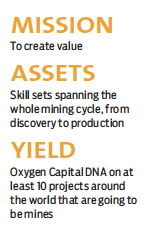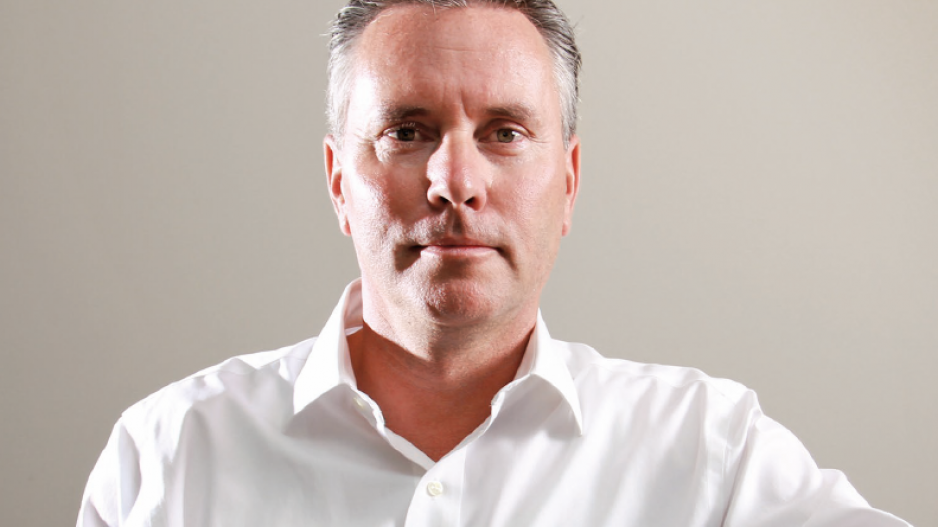Mark O'Dea might be one of the few Lower Mainlanders who actually enjoy their commute to work.
When the weather is nice, he travels from his home in Deep Cove to Coal Harbour by boat.
“I’m completely addicted to boating and fishing,” said the 47-year-old co-founder and CEO of Oxygen Capital Corp., an umbrella group for three junior exploration and mining companies. “I’m usually out on the water at least one day a week.”
In addition to the 18-footer he keeps in Deep Cove for commuting and for prawning and crabbing with his kids – ages 11, 9 and 6 – he keeps a cabin cruiser in West Vancouver for family outings and salmon fishing.
“I take guys in the office here out salmon fishing in the harbour and over to the Gulf Islands on a regular basis,” he said.
The “guys” are his partners and team of experts at Oxygen Capital, which he co-founded with Don McInnes, Alex Holmes and Sean Tetz-laff, following the sale of Fronteer Gold to Newmont Mining Corp. (NYSE:NEM) for $2.3 billion in 2011.
O’Dea describes Oxygen Capital as a non-profit mining house – an incubator of sorts that shares technical resources (including a team of eight engineers and geologists) with three companies founded by O’Dea and his partners: True Gold Mining Inc. (TSX-V:TGM), Pilot Gold Inc. (TSX-V:PLG) and Pure Gold Mining Inc. (TSX-V:PGM).
Each public company has its own CEO. O’Dea is executive chairman for True Gold, chairman of Pilot Gold and a director for Pure Gold.
Oxygen’s flagship project is True Gold’s Karma gold mine in Burkina Faso, which is set to go into production in nine months – no small feat, given that it has been financed during one of the worst mining bear markets in decades.
“Mark is someone with relentless drive,” said Dan Wilton, who was O’Dea’s investment banker from 2004 to 2013. “If he’s been able to demonstrate anything in the last three or four years – which is three or four years in the worst downturn in the mining market in 20 years, probably – it’s really that tenacity and perseverance. I would argue he has been one of the more successful people in this downturn.”
Despite having fully financed the $135 million Karma gold mine, the share value for True Gold is down 78% since its high of $1.02 per share in 2011.
“We have not been inoculated against declining share prices, despite the fact that we’re financed and that we’ve delivered on each one of our promises,” O’Dea said.

Typically, junior exploration companies find new deposits and may take a project to the early development stage. But few actually end up building a mine. They are usually bought out by a large mining company, as was the case with Fronteer, which owned gold properties in Nevada.
With the Karma project, True Gold and Oxygen Capital are changing the discovery-development model.
“We’re in a very different kind of paradigm for exploration and mining and the resource sector compared to the prior decade,” O’Dea said.
Oxygen has brought in all the skills it needs to take a mine from discovery to production. So, if no buyer with deep pockets comes along, Oxygen has the wherewithal to go it alone, he said.
“We’ve now built the skills in-house to build these mines,” he said. “We’re not waiting for the exit through a sale. We’re capable of taking these projects through permitting, construction and operations. And, in fact, that might be the creation of the most value, as opposed to selling at the bottom.”
Born in England and raised in Newfoundland from age 10 to 20, O’Dea went to Carleton University, where he earned an honours degree in geology. After graduating, he came to British Columbia, where he worked as a geologist on a number of projects.
Between jobs, he travelled throughout Southeast Asia and also spent six months cycling around Australia and New Zealand. It was while he was in Australia that he decided to go back to school to get a PhD in geology.
He chose Monash University in Australia because of a professor there – Gordon Lister – who was one of his biggest influences.
“I tracked him down as I was finishing up my mountain biking trip and knocked on his door and said, ‘I just cycled around Australia and I’d like to come and do a PhD with you.’”
After getting his PhD, he flirted with the idea of teaching. But all the teaching jobs at the time were in Australia, and he wanted to come home to Canada.
Arriving back in B.C., he set up a consulting office for a Perth-based geology consulting group and eventually struck out on his own, prospecting for copper in India.
It was while he was in India that he entered a crowdsourcing-style contest held by former Goldcorp Inc. (TSX:G) CEO Rob McEwen. The idea was to have geologists study data from one of the company’s properties in Ontario and come up with ideas about where the gold might be.
O’Dea spent three months analyzing the data and submitted his findings. He came in second, which brought an $80,000 cash prize and enough acclaim to kick-start his career.
“It was one of these pivotal moments in one’s life that change the direction of your life forever,” O’Dea said. “I was approached immediately the next day by two individuals – Wayne Beach and Hugh Snyder – who were venture capitalist mining entrepreneurs based in Toronto, who offered me the reins of a small shell company called Fronteer Development Group.”
In 2000, the company had an exchange listing, $1 million and no assets. It was O’Dea’s job, as CEO, to go out and find something.
“I had never run a public company,” O’Dea said. “I had never run anything remotely like that, and I needed a lot of help. We had a very good, seasoned board, and they were very supportive.”
Over a decade, Fronteer examined hundreds of potential projects, and it ended up focusing on gold projects in Turkey, Nevada and Labrador.
“From 2001 to 2011, we created a little over $3 billion worth of shareholder value, and it correlated with one of the biggest booms in the resource sector,” O’Dea said.
In 2006, Fronteer spun off a company, Aurora Energy, based on a uranium deposit the company found in Labrador. Aurora was taken public, with Fronteer keeping a 40% interest.
When uranium prices crashed, Aurora’s value dropped so steeply that Fronteer decided to buy it back and take it private. O’Dea kept the project alive; in 2011, Fronteer sold Aurora to Paladin Energy Ltd. (TSX:PDN) for $260 million.
That left Fronteer a pure-play gold company, which Newmont acquired in 2011. O’Dea and the other key shareholders kept some of the early-stage assets the company had in Turkey and Nevada, however, and formed Pilot Gold around them, with O’Dea serving as chairman. Newmont came in as a large shareholder in Pilot.
“We quickly realized that, with the skill sets that we had, we could do a lot more than just Pilot,” O’Dea said.
O’Dea has a significant stake in all three companies under the Oxygen Capital umbrella, which uses a shared-resources model to help the three companies in the group reduce costs.
“It’s not a profit centre – it’s a cost-savings centre,” O’Dea said. “So no one is making any money at Oxygen by managing these companies. Costs are just flowed through to the underlying issuer.”
O’Dea thinks poor market conditions for mining could persist for some time, which is why he believes he and his partners have hit upon the right operating model.
“I think for the time being, we’ve got a new normal that people are adjusting to,” he said.
“What it means is that we’ve got to focus diligently – very intentionally – on projects that work at today’s metal prices.” •




